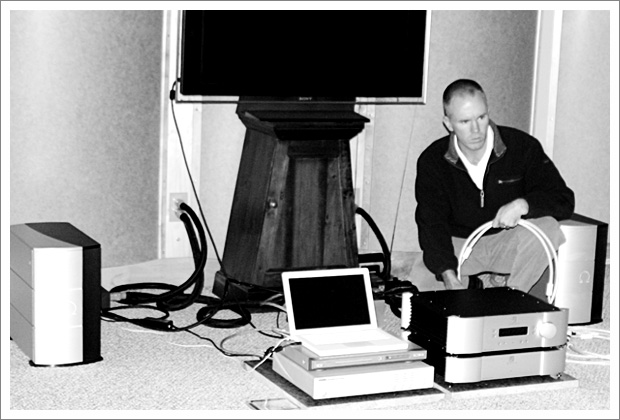| November 1, 2008
Principal High-End Principles
Every year or so, I read an article in the mainstream press
that skewers high-end audio in some way. The intent usually seems to be to make
audiophiles look weird or foolish, or to make the manufacturers of such gear look like
snake-oil salesmen. I do have some weird audiophile friends, but that doesn’t bother
me too much -- some of my non-audiophile friends are weird, too. So. Anyway,
what’s normal?
The snake-oil part is another matter altogether. Being in
the business, I cringe at some of the things I see, and I’m the first to admit that
in high-end audio, just as in most other businesses, there are shysters. I’ve
developed a few rules -- High End Principles, if you will -- that, when applied, can help
separate the wheat from the chaff.
For a product to be called "high end," it must
pass these tests:
- Cost: I don’t have a problem with high
prices per se. However, I do believe that the cost of a high-end audio product should be
arrived at in an honest manner. In a nutshell, the cost of a component should be
calculated using an equation whose primary variable is the cost of its manufacture. I know
it sounds like common sense, but a product’s retail price should have some connection
to how much it cost the manufacturer to make it. I do understand something about the cost
of running a business, and that the cost of parts is only a fraction of those expenses;
there are also employee wages, taxes, equipment, real estate, marketing, research and
development, a fair profit margin, etc. What I don’t like to see is a mentality of
"Let’s see how much we can get for it." That strategy does exist, and it
cheapens the value proposition of high-end audio and reinforces the stereotype of the
snake-oil salesman.
- Engineering: High-end products should be
thoroughly engineered. Again, what might seem like mere common sense does at times elude
reality. To me, "thoroughly engineered" starts with "It doesn’t break
all the time," but it goes further than that. For me, a product that regularly fails
is immediately disqualified -- nor do I think that anyone would disagree with that. But
the product should also be what the maker says it is. It should meet, within experimental
margin of error, the specifications claimed for it. The features touted in brochures and
advertisements for the product should be fully evident when the product is used. While
there can be an artistic side of audio-gear design, good engineering is simply mandatory.
- Quality: I love it when I get what
I’ve paid for. When you buy a high-end product, you expect excellent and strict
quality control, robust construction, tight tolerances, and fit’n’finish
appropriate to the product’s price. You’d be surprised at the number of
brand-new high-end products I’ve examined with missing screws, poorly fitting parts,
scratches, dings -- even failures right out of the box.
- Performance: There is a large helping of
subjective evaluation involved in determining whether a product meets its performance
claims, but it’s here that a product’s true measure is revealed. This goes
beyond whether a speaker, for instance, plays as low in the bass as the maker claims. It
is summed up by the value of the overall experience that the component provides its owner.
This is where the rubber meets the road.
All of these principles can be summed up in one word: honesty.
I expect a fair deal. To get what I’ve paid for. To get what I’ve been told
I’m buying. If a high-end product doesn’t meet my expectations in any of the
areas above, then at some level it is devaluing the high-end audio experience and
reinforcing those stereotypes you sometimes read in the mainstream press. I see my
expectations as a baseline -- a pass/fail proposition that defines the high end that I so
enjoy.

. . . Jeff Fritz
jeff@ultraaudio.com

All contents copyright Schneider Publishing Inc., all rights
reserved.
Any reproduction, without permission, is prohibited.
Ultra Audio is part of the SoundStage! Network.
A world of websites and publications for audio, video, music, and movie enthusiasts. |

